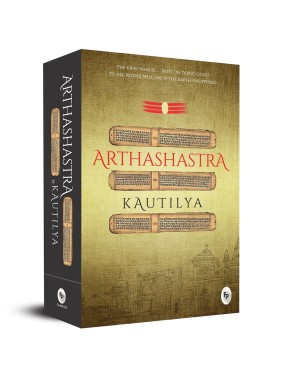
Arthashastra by Kautilya
- Write a review
|
Arthashastra is an ancient Indian text on statecraft and governance, written by Kautilya, a philosopher and statesman. The Arthashastra ( अर्थशास्त्र, Arthaśāstra ) is an ancient Indian Sanskrit treatise on statecraft, economic policy and military strategy.[1][2][3] Kautilya, also identified as Vishnugupta and Chanakya, is traditionally credited as the author of the text.[4][5] The latter was a scholar at Takshashila, the teacher and guardian of Emperor Chandragupta Maurya.[6] Some scholars believe them to be the same person,[7] while a few have questioned this identification. |
This edition features the original text with a beautifully designed cover. With insights on politics, economics, and military strategy, this book remains relevant to modern-day readers interested in leadership and governance.
The text is likely to be the work of several authors over centuries.[10] Composed, expanded and redacted between the 2nd century BCE and 3rd century CE,[11] the Arthashastra was influential until the 12th century, when it disappeared. It was rediscovered in 1905 by R. Shamasastry, who published it in 1909.[12] The first English translation, also by Shamasastry, was published in 1915.
The title translates as "the science of wealth" (अर्थ), but the book has a broader scope. It includes books on the nature of government, law, civil and criminal court systems, ethics, economics, markets and trade, the methods for screening ministers, diplomacy, theories on war, nature of peace, and the duties and obligations of a king.[17][18][19] The text incorporates Hindu philosophy,[20] includes ancient economic and cultural details on agriculture, mineralogy, mining and metals, animal husbandry, medicine, forests and wildlife.
The 'statecraft explores issues of social welfare, the collective ethics that hold a society together, advising the king that in times and in areas devastated by famine, epidemic and such acts of nature, or by war, he should initiate public projects such as creating irrigation waterways and building forts around major strategic holdings and towns and exempt taxes on those affected.[22] The text was influential on other Hindu texts that followed, such as the sections on kings, governance and legal procedures included in Manusmriti
Data sheet
- Language
- English
- Type
- Paper Book
- Authors
- KAUTILYA

